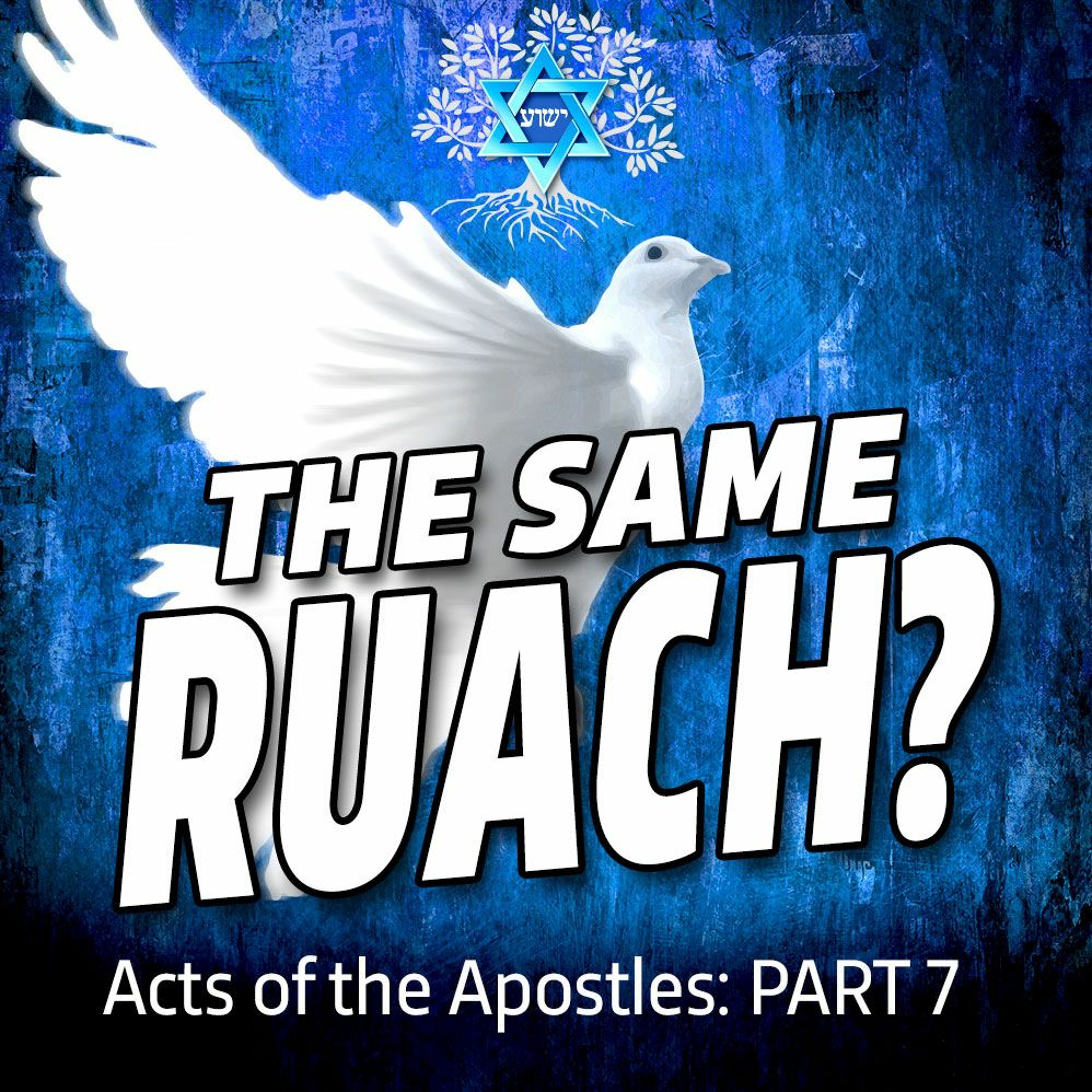Episode Transcript
[00:00:00] What if God's greatest gifts have to be broken before we can truly receive them? At Mount Sinai, the first tablets were smashed before Israel could really be ready for the second, and when Yeshua came ready to establish his kingdom, he was rejected and broken. For us, both moments were full of loss, but also full of hope for what was still to come. Join me to discover the connection between the second coming of the Torah and the second coming of our Messiah in this week's five Minute Torah Shalom and Blessings from Shalom Macon, the place where disciples of Yeshua learn, connect and grow. I'm Darren and before I get into the five minutes of my five Minute Torah commentary, let's cover a few quick facts about this week's Torah portion. This week we are studying the 46th portion of the Torah cycle, the third portion of the Book of Deuteronomy. We are in the portion of Ekev Deuteronomy 7:12, 11:25 and here are the three things that you need to know about it. Number one spiritual food spiritual service in Deuteronomy 8:3 we find the verse Yeshua quotes when tempted by the adversary in the wilderness, man does not live by bread alone, but man lives by every word that comes from the mouth of the Lord. This reminds us that the Torah is our true spiritual nourishment, sustaining us in times of need of verse 8 lists the seven species of the land of wheat, barley, grapes, figs, pomegranates, olives, and date honey, symbols of God's blessing and abundance. Then in verse 10, we are commanded to give thanks after we have eaten and you shall eat and be full, and you shall bless the Lord your God. While Jewish tradition also encourages blessings before meals instituted by the sages and modeled by Yeshua, the the actual mitzvah is to bless after eating, a habit worth cultivating. Number two Love and Fear the Summary of Torah Many people see the Torah as nothing more than a list of rigid do's and don'ts replacing relationship with rules. But this week's Torah portion makes God's priorities clear. What he desires most is our love, reverence and obedience flowing from the heart, as Deuteronomy 10:12, 13 says and now Israel, what does the Lord your God require of you but to fear the Lord your God, to walk in all his ways, to love him, to serve the Lord your God with all your heart and with all your soul, and to keep the commandments and statutes of the Lord which I am commanding you today for your good. Love and fear are not opposites. Here they work together to form the foundation of true service. And number three, the coming kingdom. Circumcision of the heart. God's greatest desire is for his children to love him and walk in his ways. But until the new covenant is fully realized, when our hearts will naturally desire to obey him, see Jeremiah 31. We must put in the hard work to train our hearts to submit to his authority, as Deuteronomy 10:16 commands. Circumcise, therefore the foreskin of your heart, and be no longer stubborn. The call to circumcise the heart is a call to remove anything that resists his will, preparing us for the day when his kingdom is fully established on this earth. What does it really mean to live by the Spirit of the Law and not the letter of the Law? For centuries, believers have been told that the Law of God is a burden and something Yeshua came to set us free from. But what if that's not what the Scriptures say at all? What if Paul's words about the letter of the law killing were never meant to pit God's spirit against his own commandments? In my new book, Spirit of the Law, I take a closer look at the writings of Paul, the teachings of Yeshua, and the Torah itself to uncover a consistent truth. The problem was never God's Law. It was the human heart. And rather than repealing his Father's commandments, Yeshua came to transform our rebellious heart, empowering his disciples to walk in the fullness of the Spirit of the Law. But in order to accomplish this, we first need to understand what it means. If you've ever struggled to reconcile law and grace, Spirit of the Law will open your eyes to a richer, more faithful understanding of both. It will challenge assumptions, bring clarity to misunderstood passages, and invite you into a deeper walk of obedience, one that's alive with the Spirit of God. Pick up your copy today and let the Spirit of the Law transform the way you see God's word and the way you live it. It may just be the missing key you've been looking for to unlock the Scriptures and open a whole new world of biblical understanding. Once it clicks, you'll want to invite others to join the journey. That's why. Well, this week's Torah commentary is called the Second Coming of Torah and comes from my book, Five Minute Torah, Volume 3.
[00:04:45] Sometimes we wonder why things happen the way they do. Why did things have to go terribly wrong before they can be made right? Why did things have to break before we tend to them the way we should have in the first place? In this week's Parasha. We are reminded of this very fact as Moses recounts to the Israelites the various events leading up to their present situation. He recalls the story of the original giving of the Asrat Hatvarim, the Ten Sayings, also known as the Ten Commandments. At that time, the Lord said to me, cut for yourself two tablets of stone like the first, and come up to me on the mountain and make an altar of wood, and I will write on the tablets the words that were on the first tablets that you broke, and you shall put them in the ark. So I made an ark of acacia wood and cut two tablets of stone like the first, and went up to the mountain with the two tablets in my hand. And he wrote on the tablets in the same writing as before, the Ten Commandments that the Lord had spoken to you on the mountain, out of the midst of the fire, on the day of the assembly. And the Lord gave them to me. Then I turned and came down from the mountain and put the tablets in the ark that I had made. And there they are, as the Lord commanded me. This is Deuteronomy 10:1 5. God originally met with Moses at the top of Mount Sinai and gave him the commandments on on two tablets. But even while Moses was receiving the commandments from the Lord, the children of Israel plunged to one of their lowest spiritual depths. They built the golden calf. When Moses came down the mountain and saw what they had done, his heart sank. Realizing the children of Israel were no longer in the spiritual condition necessary to receive the holy and divine words of the living God, he broke the tablets, but making them unreadable. God's original plan for Israel was pushed back and a new plan was put into action. According to the traditional timeline, Moses broke the original tablets on the 17th of Tammuz. A few weeks later, after the situation with the golden calf was dealt with and the children of Israel had repented from their waywardness, Moses went up onto the mountain again on the 1st of Elulse. After 40 days, he returned and presented the new set of tablets to Israel on the 10th of Tishrei Yom Kippur, the Day of Atonement. But how can Moses have simply destroyed the first set of tablets, things so holy that they contain the commandments written with the finger of God? Deuteronomy 9:10. We have a similar problem. In the Apostolic Scriptures. God sent his only Son into the world to be received by mankind. He was to establish his rule over the nations, beginning with Israel. He spent the bulk of his ministry teaching his disciples about the kingdom of God and how sincere repentance could bring its establishment in their lifetime. His message was repent because the kingdom of God is on the brink of arrival. However, as we know, he came to his own and his people did not receive him. John 1:11 his original mission to establish the physical kingdom in Israel was pushed back and a new plan was put into action. He laid down his life on the cross. Most people think that Yeshua went to the cross because God never intended to establish an earthly kingdom. But when God gave us a chance to allow him to rule over us, we blew it. Therefore, in the body of Yeshua, God had to break that precious and holy gift he had sent to his people. We were not worthy, just like those waiting for Moses at the foot of Mount Sinai. But just as the children of Israel were given a second opportunity to receive a second set of tablets, an opportunity filled with grace and forgiveness, we have been given the hope of our Messiah's second coming. When Israel sent Moses back up the mountain to receive God's original instruction that would be carved on new tablets, the children of Israel waited in anticipation. They maintained their purity and were vigilantly aware that their actions during this time time period could dramatically affect how things played out in this second coming of the Torah from the top of Mount Sinai. Do we have this same awareness? What are we doing while we wait for our Master's return? Yeshua told his disciples a parable to warn us of the dangers of self indulgence and of living as if he will never return. Blessed is that servant whom his master will find so doing when he comes. Truly, I say to you if he will set him over all his possessions. But if that servant says to himself, my master is delayed in coming and begins to beat the male and female servants and to eat and drink and get drunk, the master of that servant will come on a day when he does not expect him, and at an hour he does not know, and will cut him in pieces and put him with the unfaithful. This is Luke 12:43 46. The question is not if he will return, but what he will find us doing when he does. May we be found faithful, honoring his word, loving one another, and walking in obedience until that day. And may that day come quickly, speedily, and in our lifetime. Amen. If you've enjoyed diving deeper into the Jewish context of Scripture and uncovering the richness of Yeshua's message, help us share it like this video to let us know it encouraged you to subscribe to our channel so you won't miss future teachings and share it with your friends who want to grow in their faith and understanding of the Bible from its original Messianic Jewish perspective. Together we can shine the light of Torah and Yeshua into a darkened world that's looking for the true light. And to continue your learning, you can click on the link recommended for you right here.



